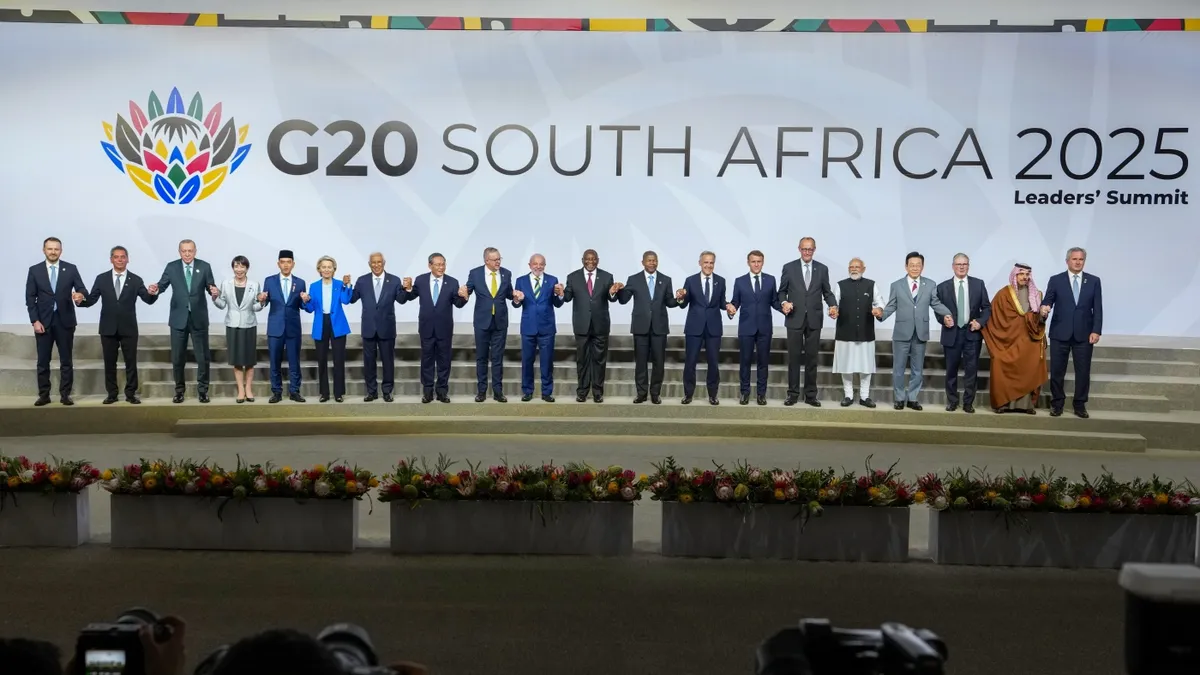
JOHANNESBURG, South Africa — The recently concluded G20 Leaders' Summit in South Africa was remarkable for several reasons, marking a significant chapter in global economic discussions. This summit was not only the first to be held on the African continent but also witnessed a historic boycott by the United States, which has not occurred in previous gatherings of the world's largest economies.
Traditionally, G20 summits conclude with a formal declaration, but this summit broke from convention by agreeing on a declaration at the outset. Additionally, the absence of a ceremonial handover between the outgoing and incoming G20 chairs was unprecedented. The U.S. administration, led by former President Trump, had previously accused the South African government of confiscating land owned by white citizens and turning a blind eye to violence against white Afrikaners, prompting the boycott. Furthermore, the U.S. expressed discontent with the summit's focus on Diversity, Equity, and Inclusion (DEI) initiatives.
Despite these challenges, South African Minister of International Relations, Ronald Lamola, expressed optimism as the summit concluded on Sunday at a convention center near the iconic township of Soweto. "In a nutshell … this has been a great success for our country," Lamola stated, highlighting the positive outcomes of the summit.
Host President Cyril Ramaphosa officially closed the meeting, using a ceremonial gavel to mark the event's conclusion. "This gavel of this G20 summit formally closes this summit and now moves on to the next president of the G20, which is the United States," he announced, indicating the next summit would take place in the U.S. next year. Normally, the outgoing chair would hand over the gavel to the incoming chair, but with Trump absent, the U.S. requested that Ramaphosa pass the gavel to a junior embassy official. South African officials, however, deemed this a breach of protocol, with Ramaphosa's spokesperson, Vincent Magwenya, stating, "It has never happened before and it was never going to happen for the first time here in South Africa."
The United States had also urged South Africa not to issue a joint declaration at the summit's conclusion, suggesting it only be labeled a chair's statement. However, Ramaphosa boldly announced at the opening that a consensus had been reached, leading to the issuance of a joint statement without U.S. involvement. While G20 declarations are non-binding, White House spokesperson Anna Kelly criticized this move, claiming Ramaphosa was unwilling to facilitate a smooth transition of leadership. Trump, she noted, looks forward to restoring legitimacy to the G20 next year, with plans to host the event in Florida.
The joint declaration included language on DEI, emphasizing the urgency of addressing climate change, the pursuit of gender equality, and the economic challenges faced by developing nations. Argentina, represented by its libertarian president Javier Milei—an ally of Trump—did not attend the summit in a show of solidarity but sent other officials in his place. Despite voicing some concerns over the declaration's language, Argentina ultimately accepted it.
World leaders present at the summit expressed gratitude to South Africa for its leadership in hosting the event. French President Emmanuel Macron was notably supportive, offering Ramaphosa a warm embrace. However, while Ramaphosa hailed the summit as a victory for multilateralism, Macron pointed out the evident divisions that persisted among member nations. Ramaphosa emphasized that South Africa aimed to place the Global South at the forefront of the agenda, focusing on issues crucial to developing economies. Nevertheless, discussions on various global conflicts overshadowed the summit's primary goals, with European leaders issuing statements expressing concerns about the U.S.'s new peace plan for Ukraine. This plan, perceived by some as favoring Moscow, was deemed in need of further refinement to ensure Ukraine's security.